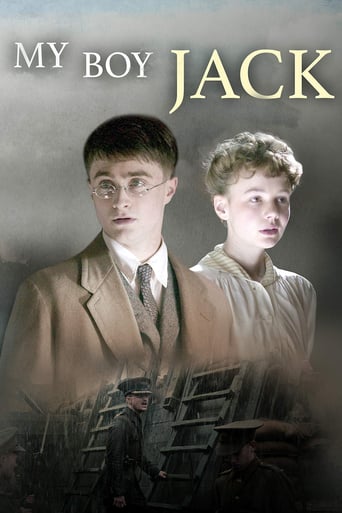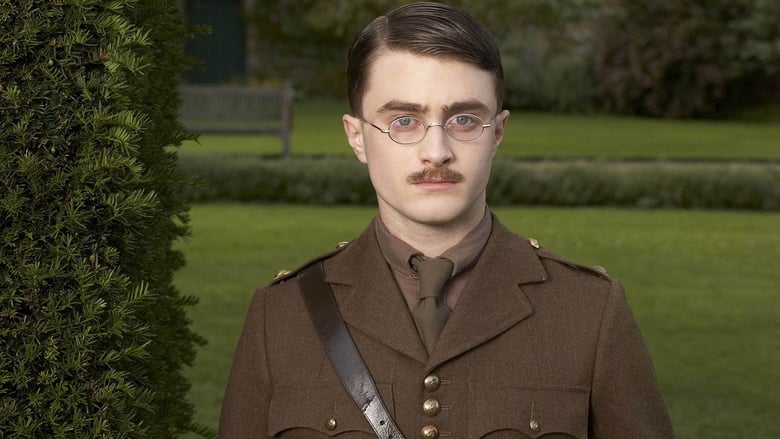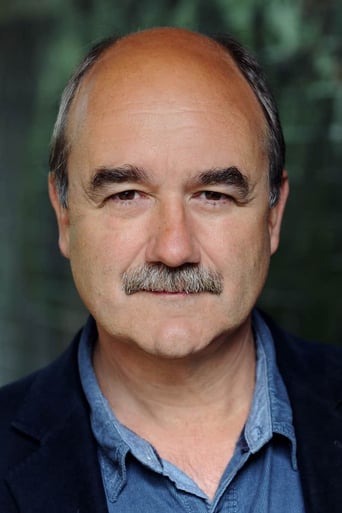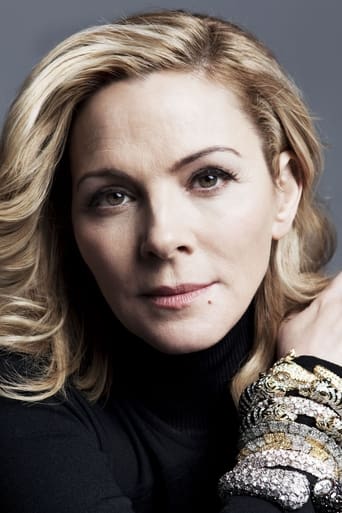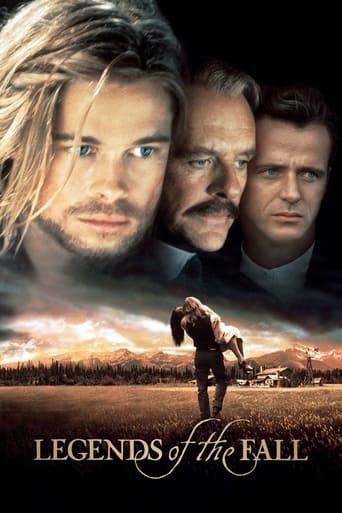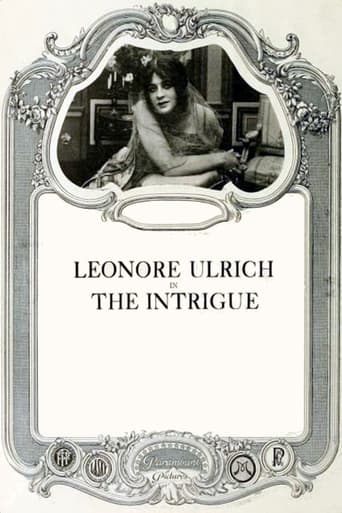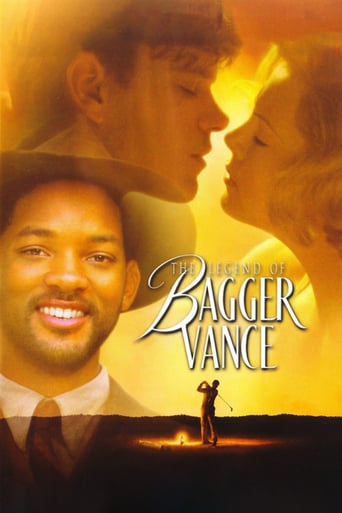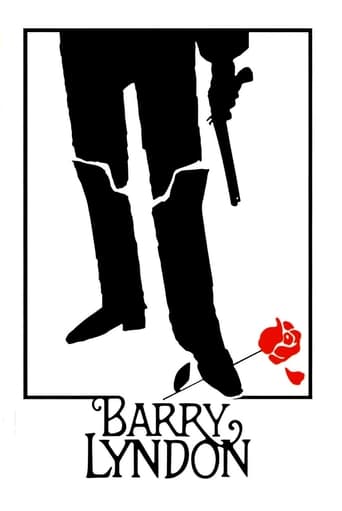My Boy Jack (2007)
Author Rudyard Kipling and his wife search for their 17-year-old son after he goes missing during WWI.
Watch Trailer
Cast

Similar titles
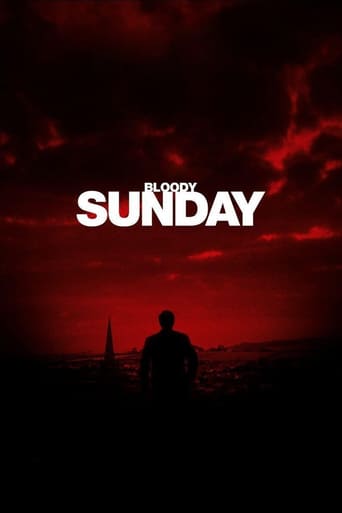
Reviews
So much average
Simply Perfect
Tells a fascinating and unsettling true story, and does so well, without pretending to have all the answers.
There is, somehow, an interesting story here, as well as some good acting. There are also some good scenes
It's 1914. John Kipling (Daniel Radcliffe) volunteers for the Navy but is rejected for poor eyesight. His famous writer father Rudyard Kipling (David Haig) is a war hawk. Rudyard eagerly pulls strings to get him into the Army which angers his beloved sister Elsie (Carey Mulligan). He leads a platoon into battle and goes MIA. Rudyard and his wife (Kim Cattrall) go in search for their missing son.Rudyard Kipling is a fascinating war hawk. David Haig gives a brilliant performance. Radcliffe and Mulligan do good work. I really like the first half. The movie stops being interesting after Jack goes missing. The story drags and ultimately doesn't have a good climax. Jack going over the top is probably a much better climax. The search doesn't have enough drama.
"My Boy Jack" is set during WWI--a war in which many millions of young men were killed for absolutely nothing (between 5-6 million of these were Brits). However, instead of being the story about a battle or large groups of men, it's about one individual--Jack Kipling, the only son of Rudyard Kipling. What makes it so compelling is that Jack shouldn't have even been in action--he was practically blind and had been repeatedly rejected for service. But, since his father was a public figure and had pushed so much for the war as well as the whole 'duty to King and country' rot, it wasn't surprising that the boy felt compelled to push and push to get into the thick of the action. What happens next isn't at all surprising--and gives his family a chance to reassess their values and commitment to the cause as well as their own part in the tragedy.This is a very effective film. Much of it is because of the fine acting by Daniel Ratcliffe (as Jack), Carey Mulligan, Kim Cattrall (as his American mother) and David Haig as Rudyard Kipling. What makes it a little more interesting is that the true story was based on a play written by Haig himself. Overall, it's a wonderful but incredibly sad film that puts an individual face on tragedy. Well worth seeing and filled with emotion--so much so that you really should have some Kleenex handy. One of the better made for TV movies I have seen.
yet again , i am very pleased with a British production. while the plot and the dialogs are quiet good (quiet great blend of realism,idealism and at times original take on conservatism in its both "old" and "new" forms forms - interesting parallel to be noticed on this "aspect"), the movie's straight is found in exceptional acting(it does make a difference when one has to start his or her acting career in theatrics and "on stage", and not being "picked up" for having a "pretty face", or as trivial things as such). while the plot is very "dear" to me in its subject matter, i got distracted by David Haig awesome performance as the father and Kim Cattrall( i would have never took her as a serious actress on the washed-up commercial "sex and the city")as a very NATURAL mother.in my opinion the movie's punch line is actually delivered by Carey Mulligan as jack's sister...i do not feel like writing much at the moment; in short, this feature gives the vibe, and plays as a periodical drama (the cars are a bit too "advanced" for 1910's years), plays accordingly, yet it cultivates the viewer's attention and his/her own thoughts and ideological views on God,king,country and Family.it is a movie for mature viewing , yet any ages would find something "sweet" about it; guaranteed.yes is true; while "made for TV", this production beats down most "blockbusters" of our time. nothing commercial to be found here, which is GREAT; only exceptional acting allowed!(Daniel Radcliffe is the only one that does not seem in sync at times, but that comes out OK since he is suppose to be "naive".also he is actually a secondary character, at face value, as far as the plot goes.)i only give 9 stars because the way that King George, played by Julian Wadham, is portrayed and which goes against the features "principles". also for certain political implications i do not fully agree with
"My Boy Jack" is the second film that successfully portrays Kipling as a character - Huston's "The Man Who Would Be King" being the first. Whereas Huston's film was a great allegory of the British Raj or empire-making in general, "My Boy Jack" relates the writer's personal tragedy at the death of his only son who died at Loos in 1915, and in what was called "the Great War" back in the days when no one knew that a greater still was shortly to come. The tragedy was compounded by the fact that Kipling had used his influence to get Jack into the Irish Guards in spite of a medical examination which Jack failed due to poor eyesight inherited from his father. The film is more than brilliantly acted by scriptwriter David Haig (Kipling), Kim Cattrall (Carrie Kipling), Daniel Radcliffe (Harry Potter graduated from Hogsworth to play Jack) and Carey Mulligan (Elsie Kipling), but it sets out to paint a slightly hindsighty and overly pacifist picture of what actually occurred. David Haig's screenplay shows us a family at war with each other, with the boy almost pressurized by his father to join the army (after he fails the Navy examination), and it shows Carrie and Elsie openly blaming Kipling for Jack's death in scenes that are more reminiscent of a modern day soap opera than a portrait of the clear-sighted Kipling and his staunch and ever-supportive American wife.There is a faint odor of post-Vietnam pacifism over the entire film, although never too explicit and always clashing with the stark realities of WWI that are also duly included: that Britain simply could not allow Germany and Austria to run rampant across Europe. Action was indeed called for, and there was no doubt about it, for, as Orwell once put it: pacifists are the objective allies of tyrants.Kipling has been called a jingoist and warmonger (a title later ascribed to Churchill whose similar stand would save Europe from the Germans some twenty years later) and Kipling has been called an imperialist but mainly by people who fail to understand his writings or, indeed, haven't read them. Kipling did not change his view of war or of the empire after the death of his son, he was always a realist although a subtle one and remained so. The film ends with a very fine and subtle dialog between Kipling and George V. The king relates the death of his own young son. The film lets George V find the body of the prince, still warm, which he counts a blessing this forms a heartrending contrast to Kipling who never recovered the body of his son at all, but there is yet another contrast in the deaths of the two sons when Kipling quotes his poem "My Boy Jack" that closes the film, indicating his small comfort found in the fact that John Kipling gave his life to a worthy cause in an ultimately inevitable war: "Then hold your head up all the more, this tide and every tide; because he was the son you bore and gave to that wind blowing and that tide."
